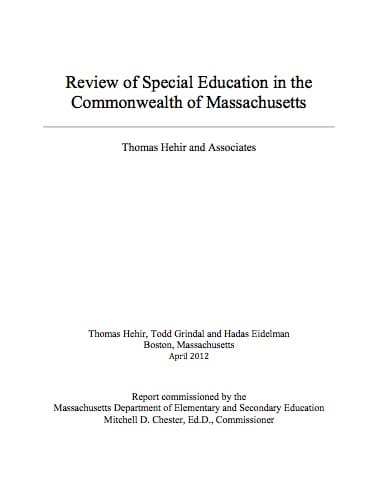 This study by Harvard researchers Tom Hehir and colleagues cracks the lid on special education in Massachusetts—which holds the distinction (perhaps dubious) of the second-highest identification rate in the U.S, with more than 17 percent of students eligible for special education services. Analysts examined both demographic and test-score data at the district, school, and student levels in roughly 300 Bay State districts and offer gobs of interesting findings—each well presented and nicely summarized. For example: Categories with the most subjective diagnoses (specific learning disabilities and communication or other health impairments) are by far the most prevalent (and are likely overdiagnosed). What’s more, low-income students are more frequently identified as having these “high incidence” disabilities than wealthier youngsters. This is particularly true for low-income pupils in high-income districts. More blacks and Latinos than whites are eligible for special-education services, but these differences mostly disappear when analysts control for socioeconomic status and other demographic characteristics. Student achievement for the Bay State’s special-needs population is better than the national NAEP average for such kids, though much of this effect can likely be attributed to MA’s high identification rates—meaning students with less severe disabilities are classified as students with disabilities. But the report mostly ignores the financial consequences of its findings, aside from the obligatory budgets-are-tight statements. Special education has long enjoyed near sacrosanct status among education-policy researchers—with few focusing on its efficacy and cost efficiency. At least some empirical attention to the cost of special-education services would have strengthened this otherwise succinct and useful contribution. To wit: The recommendations suggest new technological interventions to mainstream students with disabilities better into gen-ed classrooms (via text-to-voice technology on tablet computers, for example) without a peep about costs.
This study by Harvard researchers Tom Hehir and colleagues cracks the lid on special education in Massachusetts—which holds the distinction (perhaps dubious) of the second-highest identification rate in the U.S, with more than 17 percent of students eligible for special education services. Analysts examined both demographic and test-score data at the district, school, and student levels in roughly 300 Bay State districts and offer gobs of interesting findings—each well presented and nicely summarized. For example: Categories with the most subjective diagnoses (specific learning disabilities and communication or other health impairments) are by far the most prevalent (and are likely overdiagnosed). What’s more, low-income students are more frequently identified as having these “high incidence” disabilities than wealthier youngsters. This is particularly true for low-income pupils in high-income districts. More blacks and Latinos than whites are eligible for special-education services, but these differences mostly disappear when analysts control for socioeconomic status and other demographic characteristics. Student achievement for the Bay State’s special-needs population is better than the national NAEP average for such kids, though much of this effect can likely be attributed to MA’s high identification rates—meaning students with less severe disabilities are classified as students with disabilities. But the report mostly ignores the financial consequences of its findings, aside from the obligatory budgets-are-tight statements. Special education has long enjoyed near sacrosanct status among education-policy researchers—with few focusing on its efficacy and cost efficiency. At least some empirical attention to the cost of special-education services would have strengthened this otherwise succinct and useful contribution. To wit: The recommendations suggest new technological interventions to mainstream students with disabilities better into gen-ed classrooms (via text-to-voice technology on tablet computers, for example) without a peep about costs.
Thomas Hehir, Todd Grindal, and Hadas Eidelman, Review of Special Education in the Commonwealth of Massachusetts (Boston, MA: Thomas Hehir and Associates, April 2012).
